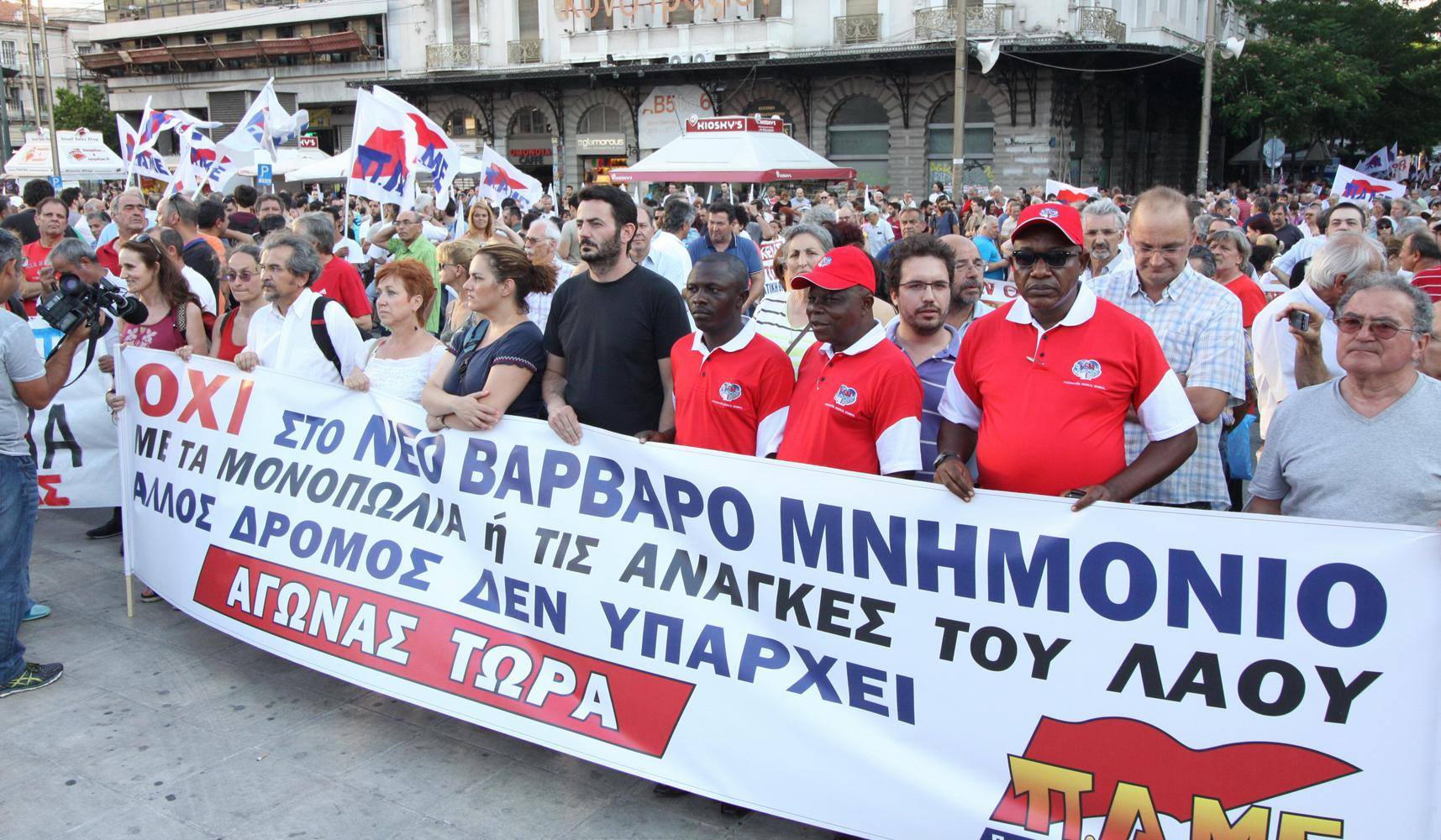



The PAME march had begun separately, in Omonia Square, while ADEDY members gathered in Syntagma Square. Video clips show that once PAME got to Syntagma, there was effectively one demonstration.
Workers interviewed by British Broadcasting (BBC), Reuters, Russian television (RTFB) and the French news agency (AFP) all called on Syriza to honor the pledge it had made to end austerity, which was what got it elected.
In its call for the demonstration, PAME said: “There is no time to lose! No resignation, frustration and acceptance of the attacks from the government, the European Union, employers. We respond by organizing struggles in every workplace, every business, every neighborhood. We strengthen PAME, class trade unions, popular committees.” (Red Globe, Aug. 11)
Nevertheless, the austerity proposal still passed by a margin of 222 votes in favor to 64 against, with 11 abstentions. But the government of Alexis Tsipras lost so many votes from his own party — more than 40 Syriza members of Parliament voted against the proposal — that under Greek law, he has to call for a vote of confidence and probably new elections.
Even though the vote was lopsided, there was still a lot of opposition inside Parliament. MPs pointed out that they only had a day or so to go through the 400-page document, which forced them to rely on summaries.
Panagiotis Lafazanis, former minister of energy, and 12 other MPs announced they would form a coalition against this new memorandum. Lafazanis, who leads a group called the Left Platform inside Syriza, had begun his political career in the KKE. He left it in 1992 to join a eurocommunist organization called Synaspismos.
Zoe Konstantopoulou, speaker of the Greek Parliament and a leader of Syriza, refused to call it an “agreement.” In a speech to Parliament on July 22, during the first debate over accepting this proposal, she had said: “Those conditions are blatant blackmail by foreign governments of European Union member states on this government and on the members of Parliament.”
German imperialism is the leader in Europe of this anti-Greek, anti-human plan. Its finance minister, Wolfgang Schäuble, was also architect of the plan that destroyed the East German economy after the fall of the Berlin Wall. (Workers World, July 18) The austerity plan Schäuble wants to impose on the Greek economy — according to many economists, including those working for the International Monetary Fund — will drive Greece’s debt-to-gross-domestic-product ratio to over 200 percent; that is, Greece will owe twice what its economy produces in a year.
The IMF has gone further. It has taken the position that Greece’s debt is unsustainable, which means that under its rules the IMF cannot participate in this bailout.
Greece is a country in deep distress. Its workers and poor are suffering from an economy that has been in a deep depression for five years, while its bankers are looking forward to an infusion of billions of euros from this latest bailout. But both in Parliament and on the streets, resistance is rising.
As part of Workers World newspaper’s coverage marking the 50th anniversary of the liberation of…
From the PFLP Central Media Office The following statement from the Popular Front for the…
Newark, New Jersey Over 250 people, representing over 250 New Jersey endorsing community groups, attended…
Special to Workers World The following is a press release issued on April 24, 2025,…
dear Larry Krasner, we heard you sued Elon Musk over his corrupt million election giveaways…
Unions join forces against harassment and deportation of members When 200 immigrant workers – from…